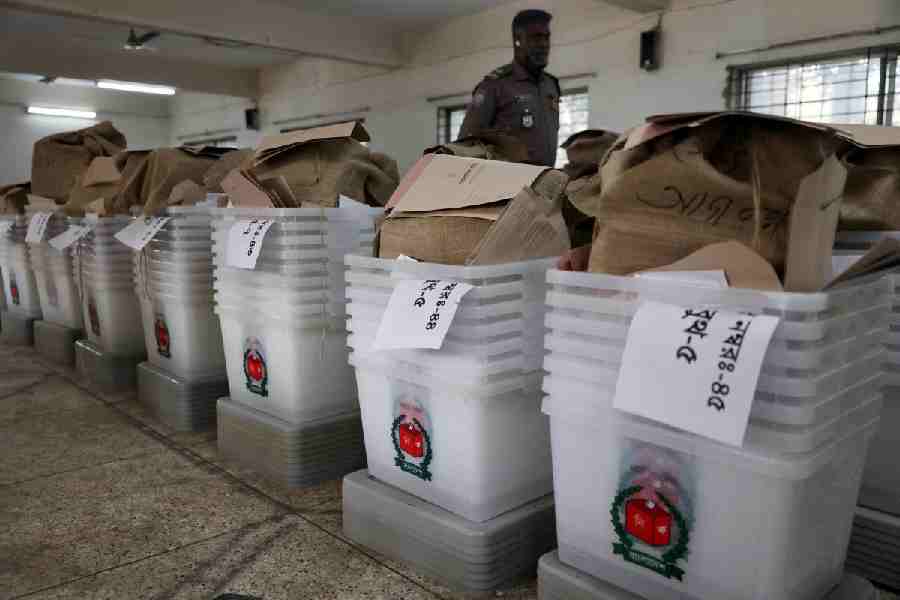 |
New Delhi, Feb. 9: Atal Bihari Vajpayee was supposed to keep his date with the Rajya Sabha.
It was December 13, 2001, a Thursday, the designated day of the week for a Prime Minister to answer questions in the upper House.
He did not.
His government was under the shadow of the “coffin scam” that involved one of his senior-most colleagues, defence minister George Fernandes. The Opposition had accused Fernandes of fiddling the deal relating to the purchase of coffins to transport bodies of soldiers killed in the Kargil conflict. Vajpayee had been advised not to appear in a controversy-afflicted Parliament because typically it would be adjourned within minutes of assembling.
So he sat before his TV at 7, Race Course Road, waiting to see what the Opposition was up to.
Sonia Gandhi was the leader of the Opposition, G.M.C. Balayogi the Lok Sabha Speaker and Krishna Kant the Rajya Sabha chairperson.
At 11am sharp, both Houses resonated with the slogan: “Coffin thief, quit your office.” That was it and the proceedings ended. Sonia left immediately for 10 Janpath.
Neither Vajpayee nor Sonia, the country’s topmost political leaders then, was in the House for what would be a tryst with destiny of a perilous kind?
Some 45 minutes after Sonia left, Parliament resonated with a staccato burst. Most journalists were then outside the chamber of Balayogi who, like his predecessors and successors, was doing the unenviable job of brokering truce between a desperate government and a recalcitrant Opposition.
At first, most people mistook the noise for a cracker burst. But the sound went on and on, thud after dull thud.
The first to smell danger were the birds. Pigeons, Parliament’s perennial residents, flapped around in frenzied circles around the stupendous dome of the Central Hall.
By then the members and non-members, who had gathered there, disregarding the order of security guards to show their special entry passes, looked terrified.
This was no Diwali celebration. It wasn’t even a mock-attack drill.
There was an ear-splitting blast and the spit of gunfire, then silence. The gunfire started again and there was another explosion. The sounds were too real and menacing for comfort.
Everybody ran helter-skelter: canteen waiters with trays of tea and coffee, journalists and MPs. Terror was an equaliser because it had dawned on everyone around that the heart of India’s democracy was under siege.
As the few elevators in the building were crammed with people seeking “safer” shelters, some, including senior ministers like Ram Naik and Nitish Kumar, huddled in cubicles meant for routine security checks.
The heroes of the day, the policemen and the policewomen, fought the five assassins who had managed to enter the complex in a car with a flashing red beacon and a home ministry sticker. The vehicle was packed with explosives.
By a merciful quirk of fate, the terrorists chose not to enter Parliament through gate No. 11, the entry to the Rajya Sabha. The distance from the gate to the upper House can be covered in minutes and had they done that there would have been a massacre because the watch-and-ward staff were unarmed.
Sonia immediately called Vajpayee and asked if he was okay. But the camaraderie didn’t last.
Hours later, the Congress president called a meeting of the working committee which deemed that an ordinance on prevention of terrorism the government had issued seven weeks earlier had proved “ineffective”.
The Congress reiterated its opposition to the ordinance.
Mulayam Singh Yadav demanded that Vajpayee, home minister L.K. Advani and Fernandes be sacked but he was not supported by his then ally, the CPM, or the Congress.
For the BJP, which had thundered to power in 1998 and 1999 for its advocacy of a “strong” state, the assault on Parliament was the second big jolt to the plank after the 1999 Kandahar hijack.
Expectedly, the suicide attack echoed beyond India’s border. Pakistan’s then President, Pervez Musharraf, condemned it, but Vajpayee’s stiff message to Islamabad was the “fight against terrorism has reached its last phase” and that he would “fight a decisive battle to the end”.
Six months earlier, he had hosted Musharraf at Agra for a summit that began with a bang and ended in a whimper.











